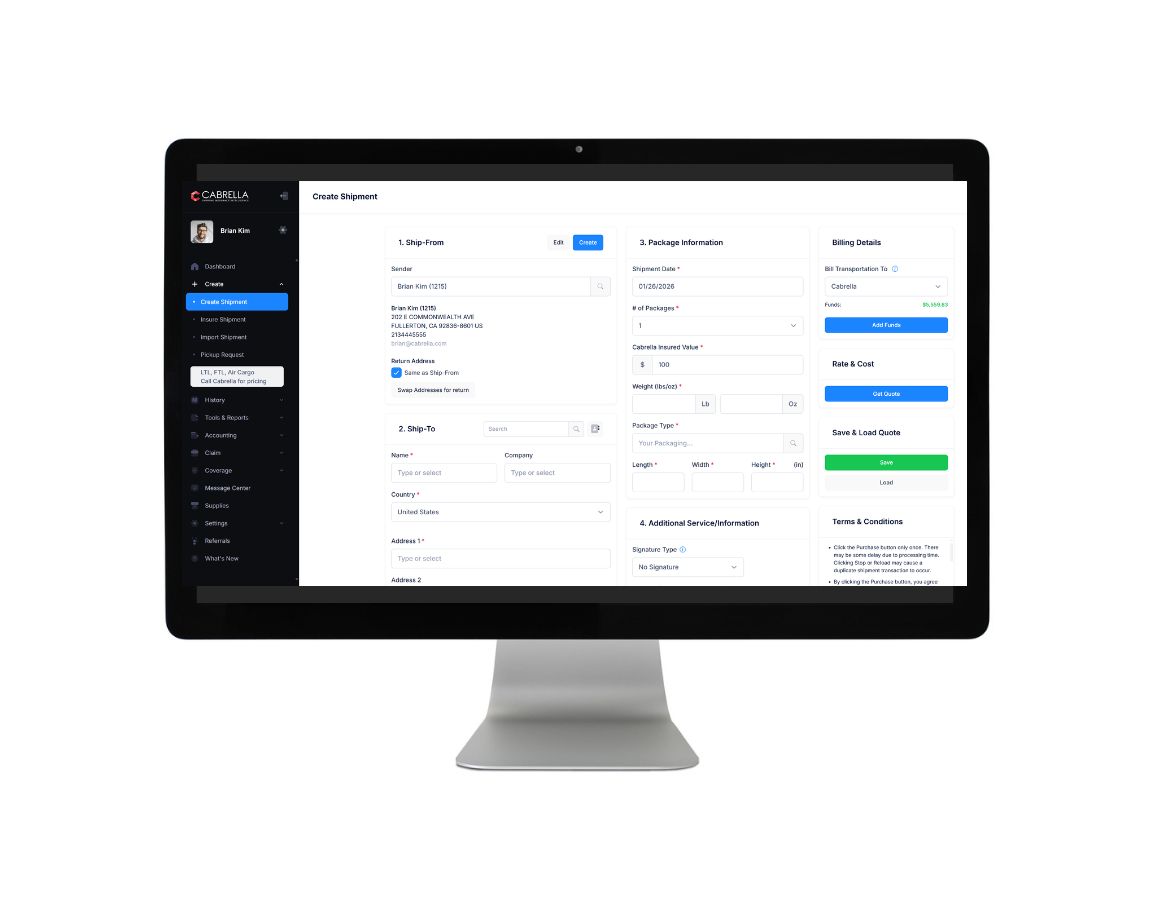The New Face of Cargo Theft: How AI-Generated Deepfakes Are Targeting High-Value Shipments
Cargo theft has taken a sophisticated turn that should concern every retail executive who ships valuable merchandise. Criminals are now using AI-generated deepfakes, hyper-realistic fake audio, video, and digital identities, to orchestrate elaborate freight theft schemes that bypass traditional security measures and cause shipping insurance claims to soar across the industry.
If you’re selling and shipping high-value products like jewelry, medical equipment, or premium electronics, understanding this emerging threat is critical to protecting both your inventory and your bottom line.

How Do Deepfakes Enable Cargo Theft?
Modern cargo thieves have moved beyond opportunistic truck hijackings. Today's criminals deploy sophisticated AI tools to create convincing impersonations of legitimate logistics personnel, company executives, and even your own employees. These deepfakes enable them to:
Impersonate Authorized Personnel
Using AI-generated voices and synthetic video, thieves can convincingly pose as truck drivers, shipping brokers, or warehouse managers. They arrive at pickup locations with forged credentials sophisticated enough to fool standard verification protocols, walking away with high-value cargo legally, at least on paper.
Manipulate Communications
Criminals use deepfake audio to impersonate executives or logistics coordinators, calling warehouses to "authorize" shipment changes or rerouting valuable cargo to fraudulent addresses. The voice authenticity is so convincing that employees rarely question these instructions.
Create Fraudulent Documentation
AI now generates professional-looking logistics websites, complete with authentic branding and interfaces that deceive suppliers into engaging with fake transport companies. These platforms facilitate the creation of fraudulent bills of lading and pickup authorizations, and then the merchandise simply "vanishes in transit."
According to Munich Re's 2025 Cargo Theft Tactics and Trends Report, these well-organized schemes have contributed to billions in annual losses across supply chain security operations, with specialized shipping insurance providers seeing increased claim volumes for high-value merchandise.
What Are The Financial Impacts of AI-enabled Theft?
The financial impacts for retail businesses extend far beyond the immediate loss of merchandise. When deepfake-enabled theft strikes, companies face:
• Direct inventory losses often exceeding hundreds of thousands of dollars per incident
• Disrupted customer fulfillment and potential contract penalties
• Complex shipping insurance claims processes requiring extensive documentation
• Reputational damage from delivery failures and customer service issues
• Increased security costs and operational complexity
For retailers shipping specialized products, like luxury watches, medical devices, or high-end electronics, a single successful deepfake theft can represent months of profit margins and irreplaceable customer relationships. Industry research from Intellicheck indicates that truck driver impersonation alone is costing logistics companies billions annually.
Why Do Traditional Security Measures Fall Short?
Traditional security measures don’t meet the needs of today because conventional cargo theft prevention relies heavily on physical security: GPS tracking, secured facilities, and driver verification. However, deepfake-enabled fraud exploits the human and digital elements of logistics operations that these measures don't address.
When a criminal can produce an AI-generated video call from your "logistics manager" authorizing a shipment change, or present synthetic identification that passes visual inspection, traditional verification protocols become insufficient. According to the Department of Homeland Security, the sophistication of current deepfake technology means that even trained personnel struggle to identify fraudulent communications in real-time.
Specialized shipping insurance providers are adapting their risk assessment models to account for these evolving threats, but the challenge requires a multi-layered approach combining enhanced verification protocols with comprehensive coverage for emerging fraud vectors.
Advanced Protection Strategies
Forward-thinking retailers are implementing sophisticated solutions that address both the technological and procedural vulnerabilities that deepfakes exploit:
Enhanced Digital Identity Verification
Organizations are implementing biometric authentication systems and multi-factor verification for all shipment authorizations to create additional barriers that current deepfake technology cannot easily overcome.
AI-Powered Detection Systems
Deploying machine learning algorithms specifically designed to identify deepfake content in communications helps organizations spot fraudulent authorization attempts before cargo is compromised.
Comprehensive Documentation Protocols
Establishing robust paper trails with multiple verification points makes it significantly more difficult for criminals to successfully execute sophisticated impersonation schemes.
Strategic Insurance Partnerships
Working with shipping insurance technology providers who understand these emerging risks ensures that coverage evolves alongside the threat landscape, protecting against both traditional theft and sophisticated fraud schemes.
The Role of Specialized Coverage
As deepfake-enabled cargo theft becomes more sophisticated, standard shipping insurance policies may not adequately address the unique challenges these schemes present. Retailers handling high-value merchandise need insurance partners who understand:
• The heightened risk profiles associated with luxury goods and specialized equipment
• The technology solutions that can help prevent and detect emerging threats
• The rapid evolution of criminal methodologies in the logistics space
The most effective protection strategies combine robust preventive measures with comprehensive coverage that accounts for the full spectrum of modern cargo theft risks.
Moving Forward: A Proactive Approach
The deepfake threat to cargo security will only intensify as AI technology becomes more accessible and sophisticated. Retailers who take a proactive stance by implementing enhanced verification protocols, partnering with specialized insurance providers, and staying informed about emerging threats will be best positioned to protect their valuable shipments and maintain customer trust.
Protecting high-value shipments in today's evolving threat landscape requires specialized expertise and comprehensive coverage. To learn how advanced shipping insurance solutions can safeguard your valuable merchandise against both traditional and emerging risks, contact Cabrella today.
Keep Checking Out Our Other Posts
Subscribe for Email Updates









